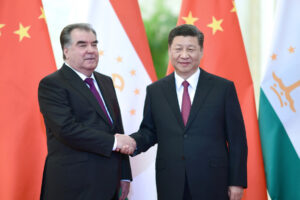Last year, the environmental group Friends of the Earth Indonesia sent a petition to Elon Musk, urging him not to invest in Indonesia’s expanding nickel industry. The organization, better known as WALHI, warned Musk that if he accepts a proposal from the Indonesian government for Tesla Motors to build vehicles and batteries in the country, his company would become complicit in an ongoing environmental catastrophe.

In recent years, Indonesia has massively increased its nickel extraction amid growth of the electric vehicle market. But the nickel industry has a record of environmental damage there, including in the Obi Islands, where pollution from mines and smelters has turned the waters red. Image by Rabul Sawal/Mongabay Indonesia.
“We understand that Tesla has invested heavily in its supply chain and battery that is generated from nickel and consider it as ‘green’ investment,” the group wrote in a lengthy letter, which was co-signed by 48 US organizations. “However, the nickel industry in Indonesia has a record of environmental damage, criminalization, threats that abuse democracy and equity, threats to vulnerable groups, and multiple violations of law.” The letter called on Musk to terminate direct investment in Indonesian nickel, prohibit the use of Indonesian nickel in Tesla operations, and observe UN standards of human rights in Tesla’s business.
Musk is the CEO of Tesla Inc., which produced 1.4 million electric vehicles (EV) in 2022, nearly 50 percent more than the year prior. The company is now in a race to secure access to nickel required for its vehicles. With more and more companies entering the EV market amid the transition to clean energy, demand for raw materials like nickel, lithium, copper, and others will continue to rise. Around the world, this will create economic opportunities, as it has for Indonesia, the world’s largest nickel supplier.
In recent years, the country has become a key player in the EV industry. It has massively increased its annual nickel extraction — from 345,000 metric tons (MT) in 2017 to 1.6 million MT in 2022 — and is now rapidly building out its EV battery industry. According to Reuters, over the past three years, Indonesia has struck over a dozen deals “worth more than $15 billion for battery materials and electric vehicle production with global manufacturers including Hyundai, LG, and Foxconn” and is now actively courting Tesla.
But such economic opportunities also come with ecological risks, and to understand them, one can look at the challenges facing Indonesia’s Obi Islands.
Situated within a marine biodiversity hotspot known as the Coral Triangle, home to the planet’s richest variety of corals, the waters of this region have long sustained resident fishing communities. But the ore-rich islands have become the epicenter of the province’s nickel mining industry, and since the arrival of nickel miners in 2008, this important ecological zone has suffered grievous damage. Thousands of hectares of forest have been torn down to make way for open quarries, while toxic mud sediments, discharged by the mines, seep into the bare soil and are swept into surrounding waterways during the rainy seasons.
On Halmahera Island, the toxic residues have ravaged coral reefs where numerous marine species, such as mackerel, tuna, giant trevallies, and leopard coral groupers, reside. WALHI hopes to prevent more destruction. Key members in this effort are affiliated with the group’s North Maluku chapter. Two of those members, Upaiwan Umar and Ariella Toety, have personally documented the marine devastation around the small fishing village of Kawasi. They described the impacts recently in an interview over Zoom. A petite woman with animated eyes and a charming, easy-going manner, Toety stood in the spacious hall of a rambling house, flanked by the heavyset Umar, who greeted me with a beaming grin on his broad face.
With Toety acting as his translator, Umar said that local fish stocks have sharply plummeted due to the toxic effluents spewed by the nearby nickel mines. “Most of them are owned by the Harita Group,” Toety said, referring to an influential Indonesian conglomerate that operates various mining subsidiaries across the region. No financial compensation had been offered to the villagers for the destruction of their livelihoods, Toety said, shaking her head. “No compensation at all.”
A Harita spokesperson strongly denied the company’s culpability for the devastation of the village’s fisheries. Mining waste from the company has not tainted the surrounding waters, she said, and the company uses former mining pits as waste receptacles, in line with government regulations. Still, the presence of so much mining, by virtue of simple chemical reactions, has the potential for ecological damage.
“Harita’s assurance notwithstanding, the global mining industry has a track record of utilizing anti-contamination safeguards that have repeatedly failed,” said Ellen Moore, an environmental consultant, referencing various incidents of North American tailing dams that disintegrated and subsequently discharged toxic mining waste into nearby lakes and rivers.
Moore also noted that tailings may leach sulphuric acid into surrounding groundwater reservoirs and rivers whenever the sulphides present in them are exposed to air and water. The resulting acidic runoff can severely harm aquatic life by lowering the pH values of resident waterbodies.
The use of tailing pits does not always prevent environmental damage. Steven Emerman, a geophysicist who has extensively studied the mining industry in Canada, says the effectiveness of tailing pits in preventing water contamination is highly contingent on many factors, such as “the permeability of the rock beneath the pit, the groundwater pathways through the pit, the interaction between groundwater and surface water outside of the pit, and the engineering measures that are undertaken to prevent contamination of surrounding groundwater and surface water.”
Kawasi residents say the mining is contaminating their fisheries and leading to the loss of their primary source of income. (A situation like this has already occurred in the Morowali district of Central Sulawesi, where many fishermen have been forced to relinquish their former occupations and instead become laborers in the nickel mines.)
Apart from having their immediate economic prospects imperiled, the people of Kawasi also face grave risks to their physical wellbeing. Research conducted by Khairun University has uncovered the presence of heavy metal toxins in an array of marine species, such as clams and red snappers, that have long been dietary staples for the residents.
Freshwater sources like the Toduku River may also have been polluted by the mining waste. While it is still too early to assess the damage caused by the presence of these toxins in the seafood and drinking water, Toety said, it is likely that the health of future generations will be harmed. “So far, no one has become sick, but it’ll take a long time before we see the damage,” she said.
Additionally, as part of its overall campaign to encourage the growth of nickel processing, the government previously encouraged the construction of a smelting plant on Halmahera Island, where a large nickel-mining project is also underway. Having commenced operations in 2021, the facility currently churns out components for EV batteries. The plant is jointly owned by the Harita Group, which owns the controlling stake, and China’s Ningbo Lygend.
The coal-powered smelter produces toxic fumes, severely degrading the air quality in the vicinity. “Many people have already developed serious respiratory problems,” Toety said. Likewise, residents of the Konawe locality in Southeast Sulawesi have also complained about the sharp increase in breathing-related illnesses, following the commissioning of a nickel smelting plant in their precinct.
The administration of the South Halmahera, meanwhile, has done little to protect the island’s rural communities. In 2018, when the Indigenous Sawai community was displaced from its communal agricultural land to make way for the establishment of a nickel mine in Weda Bay, authorities failed to intervene. Moreover, just as with the villagers of Kawasi, the government did not ensure that adequate compensation was provided to the Sawai people for the destruction of their livelihood.
On the contrary, the state agencies themselves seem to be facilitating the forcible acquisitions of village landholdings. When attempting to protest the confiscation of their farmlands, residents of Kawasi have been issued criminal charges. “Some people have been criminalized for struggling to defend their agricultural land,” Toety said in a subsequent written statement.
Nor do these recent scandals represent isolated instances of official malfeasance. As far back as 2004, when an Indigenous community in Halmhera protested against the conversion of a forested tract into a gold mine, they were met with violent reprisals from local police, resulting in the death of a civilian demonstrator.
“We have a strong suspicion that the local government of South Halmahera is involved in mining licensing corruption,” Toety said. This allegation echoes similar claims by journalists that corrupt bureaucrats in Central Sulawesi have awarded nickel mining leases to companies that have either bypassed the proper bidding process or relied on the use of forged documents to secure official authorization. The representatives for the South Halmahera administration did not respond to requests for comments.
Tesla, which did not respond to requests for comment either, seems eager to do business with Indonesian mining magnates. In August last year, the Indonesian government triumphantly declared that the company would soon start to import processed nickel products from the country.
But advocates clearly fear that in disregarding the rights violations on Kawasi and other disempowered Indonesian rural communities, Tesla will further encourage the abuses being carried out by the nickel industry. Future Tesla customers, then, will bear a moral responsibility to demand that Tesla and other EV manufacturers duly compensate those who have been disproportionately burdened by efforts to diminish our collective carbon footprint.
Source : Earth Island Journal















